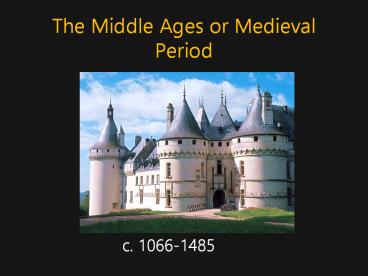The Middle Ages or Medieval Period - PowerPoint PPT Presentation
Title: The Middle Ages or Medieval Period
1
The Middle Ages or Medieval Period
- c. 1066-1485
2
The Beginning
- Battle of Hastings in 1066
- Duke William of Normandy (France) defeated the
last Anglo-Saxon king, Harold. - William wanted to rule rather
than destroy. - Anglo-Saxon property
was divided among
Williams followers - First tax system created
3
Bilingual England
- After the Battle of Hastings, French became the
official language of government, law, education,
and upper-class life. - Middle English continued to be spoken by the
lower and middle classes. - For about three hundred years, England was a
bilingual country.
4
The Feudal System
- The king owned all of the land.
- 25 of land was granted to the church
- 55 of the land was granted to the nobles
- The nobles and the church would grant land to
lower-ranking freemen who would promise knights
when needed - Peasants would work the land and provide food and
pay taxes
5
The Church
- Roman Catholic Church
- Preached a common set of beliefs and values
- The Church had its own taxes, laws, and land
- Could strongly influence the king
- The Church would accept gifts and money in return
for guaranteeing a person a place in heaven or
favors. - Opposing the church resulted in excommunication
going to hell.
6
The Crusades 1095-1291
- Holy wars Christians vs. Saracens (Muslims)
- The purpose was to rescue holy places (primarily
Jerusalem) from the Muslims - Crusaders received indulgences (forgiveness) for
past sins. - Total of 9 crusades the first 5 had the blessing
of the reigning Popes.
7
Chivalry and Courtly Love
- Was a system of ideals and social codes governing
the behavior of knights - Stressed honor, courage, and courtesy
- Moved the rough medieval knight from the status
of warrior to that of gentleman. - Created by the Church to set rules for the game
of war.
8
Courtly Love
- Courtly love was, in its ideal form, nonsexual.
- Brought about an idealized attitude toward women
- Did little to improve their actual position.
- A noble or upper-class womans value remained
tied to the value of the lands she brought to a
marriage. - Most marriages were arranged
- Women were still dominated by the male members of
their family.
9
Medieval Romance
- Gallant love, chivalry, and heroism were
portrayed in the King Arthur stories - English writer, Sir Thomas Malory, later re-told
the French versions of the stories in Middle
English - Le Morte dArthur
- The book was printed just weeks before the last
real battle with knights
10
Vernacular and Secular Literature
- Secular non-religious literature (chronicles and
miracle plays) - Vernacular Literature written in the common
language - Middle English
11
The Black Death
- The Black Death, or bubonic plague, struck
England in 1348 and continued to reappear. - Highly contagious and spread by fleas from
infected rats, - Reduced the nations population by up to 1/2.
- The Black Death caused a labor shortage, leading
to the serfs freedom, women in the work-force
and an end of feudalism.
12
The Hundred Years War1337-1453
- Two English kings (Edward III and Henry V)
claimed to be the heirs to the throne of France
- Joan of Arc 16 year old girl who fought on the
side of France with several victories. Claimed
visions from God. - The war resulted in new weaponry and war tactics
13
A New England
- The English lost the Hundred Years War with
France - By the wars end the yeoman (small landowners)
had replaced the knights in armor. - With this emergence of the yeoman class, modern,
democratic England was born.
14
Language and Literature
- English became the primary language (late 1300s)
- The Hundred Years War created a feeling of
patriotism - The majority of people spoke English
- Geoffrey Chaucer
- father of English literature
- Wrote Canterbury Tales
- William Caxton
- brought the printing press to England
- This helped spread English.
15
Focus Question 1
- What were some of the effects of the Battle of
Hastings on the Anglo-Saxons? - Lost their property
- First tax system was created
- French became the language of government,
education, and the upper-class - French intermingled with the vernacular
- England was bilingual for 300 years
- Women were subjugated by men
16
Focus Question 2
- Describe the Church in the Middle Ages and the
role that it fulfilled. - Roman Catholic
- Sanctioned the first 4 crusades
- Owned a large amount of land and property
- Imposed its own taxes and fees
- Had a strong influence over the king
- The Church was very corrupt gave indulgences or
forgiveness in return for money, gifts or favors
17
Focus Question 3
- What was the role or position of upper-class
women in society? - Seen as property to be married off to form
alliances - Her value was based off of the lands she brought
to the marriage - Must remain pure and chaste
- Women were under the control of their fathers and
then their husbands - Received little to no academic education
18
Focus Question 4
- During the Middle Ages, what were some events
that had a great impact on England? - The Black Death or Bubonic Plague
- The introduction of the printing press
- The Battle of Hastings
- The Crusades
- The Hundred Years War
- English becoming the official language
- The end to feudalism
19
Focus Question 5
- Describe the different types and genres of
literature as well as the important authors of
the Middle Ages. - Secular chronicles and miracle plays
- Vernacular literature Ballads and folk epics
- Medieval Romances
- Sir Thomas Mallory Le Morte DArthur
- Geoffrey Chaucer Canterbury Tales

